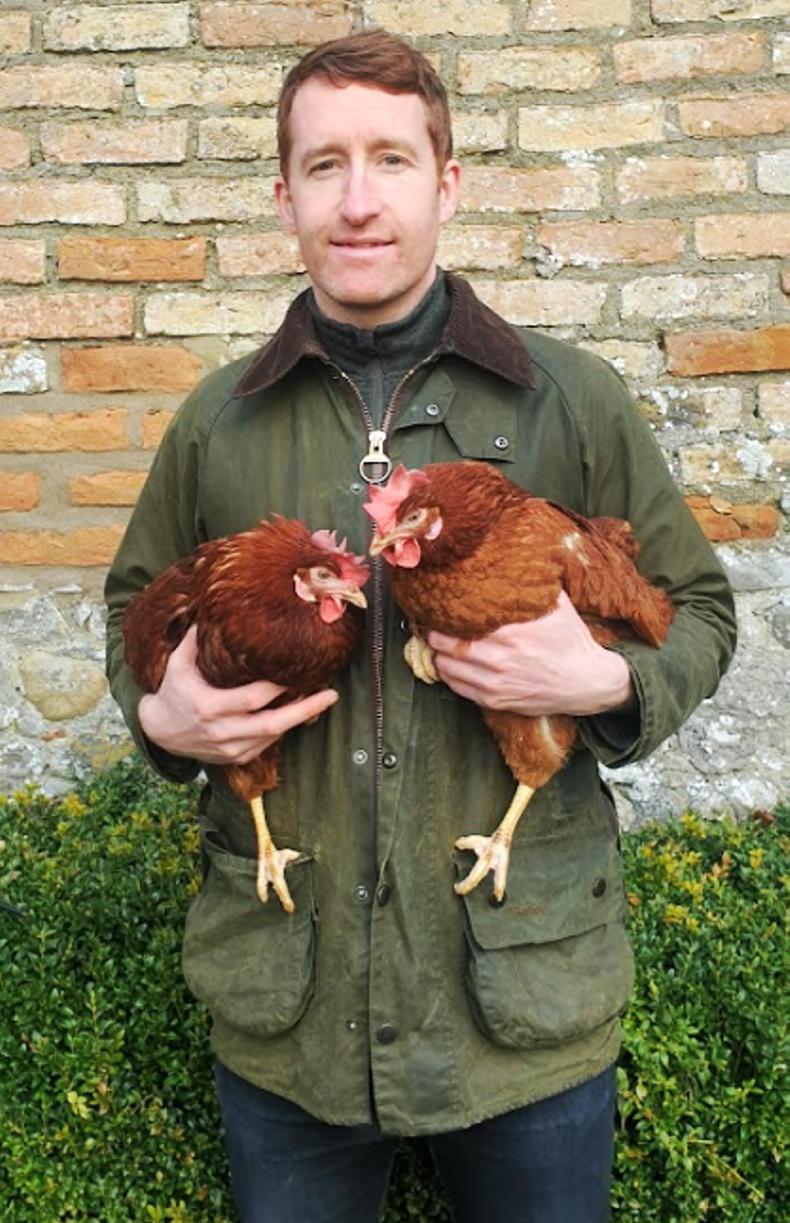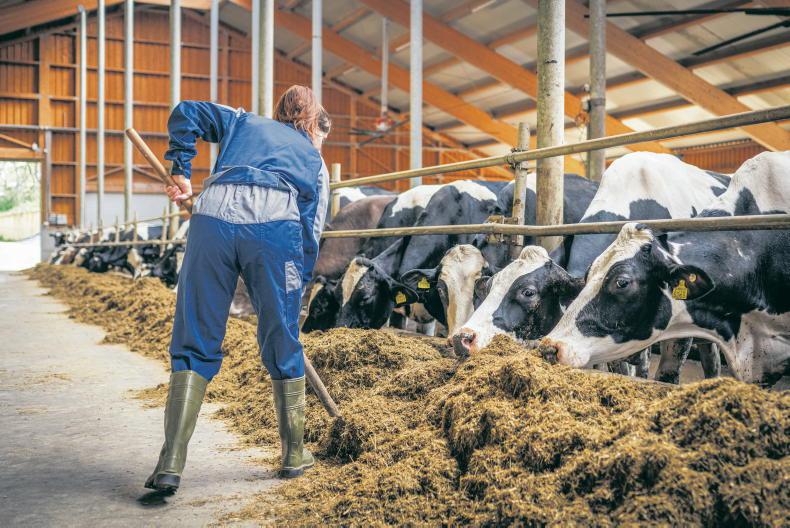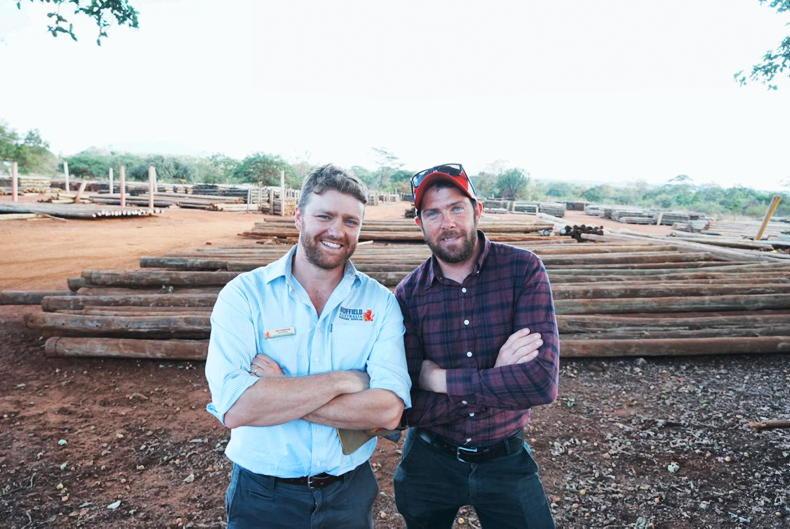The importance of improving sustainability in egg production was the key message shared by 2021 Nuffield Scholar Alex Eivers at the 2022 Nuffield Ireland Annual Conference.
The Nuffield Farming Scholarship is a leadership development programme. Participants are supported financially and through peer support and mentoring to pursue international travel, gain global connections and bring their learnings home to share with the sector. They present a report on their chosen topic at the culmination of their travel which is available on the Nuffield Ireland website.
Alex, who was awarded a Nuffield scholarship in 2021 explains that his interest in agriculture stemmed from his upbringing on his family farm.
“I grew up on a farm in Co Meath, [with] 200 acres. We had stock and cereals.” When Alex was 10 years of age, the family started in free range egg production.
Education
Alex studied Agricultural Science in University College Dublin (UCD) specialising in Agri-Business.
After college he spent some time travelling; “I was always involved in horses working through college so I spent some time in Kentucky,” he says.
Thereafter, Alex completed a graduate programme with Keelings Fruit starting his career in the commercial office. “I came in as a buyer and from there I was involved in ?relationship management and procurement of fresh produce for the Irish retail market,” he explains.
He worked in the fresh produce industry for 10 years and became a commercial manager, specialising in citrus fruit and exotics a role that provided him with the opportunity to travel abroad. “I always loved to travel, and I was lucky enough with the citrus, melons and pineapples I got to travel extensively. I always wanted to do a gap year but the job I was in allowed me to see a lot of the world, which I was very fortunate to do.”
Full time farming
The farm, however, eventually drew him home; but it was a phased return based on expansion.
“I was always part time farming with my mum at home. About six/seven years into my full-time career I decided to expand at home, as I was full-time working, which gave me the ability to jump back into full-time farming. There were 20,000 hens at home. Two years before I decided to come home full- time, we made a large investment doubling production to 40,000 hens. It’s about 250,000 eggs a week.”
Alex trades under the company name Foxbrook Free Range eggs selling to The Nest Box Egg Company, where his brother Brian Eivers is managing director. The eggs are then marketed and distributed to the Irish market and also the middle east. The middle east provides great opportunity for Irish free-range eggs, Alex explains.
“We produce eggs in Ireland to a very high welfare standard, probably up with the highest in Europe. There is a demand for that in Dubai,” he says.

Alex Eivers
The reason Alex applied to Nuffield was to investigate global agriculture.
“When I came back full-time farming, I wanted to expand the business even more in terms of egg production. With COVID and certain issues around that, I wanted to get a broader understanding of global agriculture, which is when I decided to do Nuffield.” Alex was encouraged by his friend, fellow Nuffield scholar, managing director of Hughes Farming Ltd, Julian Hughes who advised him to give it a go, describing it as a great opportunity “to go out and really study what your industry is on a global scale and bring it back to Ireland to your own business”.
Although COVID-19 prevented him from travelling abroad initially, it made him focus on trends in Ireland’s production system. “It flicks a switch in your head to really focus in on trying to find answers to what you’re looking for. I have travelled quite extensively over the last 10 months while trying to work full-time as well.” Alex has three full time staff working on the farm at the moment along with his mum who has managed the day to day running of the farm while he was away.
Research findings
Alex’s Nuffield study is titled “How to adopt to market demands and change in the Irish Egg industry”.
During his presentation at the Nuffield 2022 Conference, he presented four main recommendations focused on sustainability.
“It’s the buzz word at the moment, each industry has to do its part,” he says.
1. Introducing white birds
“White bird ?egg production is far more efficient and sustainable than what we traditionally do here in Ireland which is brown eggs from brown birds. A white bird will produce 500 eggs in her lifetime vs 350 eggs that a brown bird [will produce].” They have lower feed intake, better feed conversion ratio and live up to 100 weeks vs 75/85 weeks with a brown bird.” It’s about creating awareness around these results and outlining there is “no difference to the nutritional value, the only change is the pigment in the shell,” says Alex.
2. Producing medium sized eggs instead of large
“Traditionally in Ireland we produce large free-range eggs that puts extra pressure on the bird, feeding it a higher level of protein over a longer space of time.” It’s important to educate consumers that “a medium egg is more sustainable from a bird point of view and a protein consumption point of view. A larger egg means the bird lives a shorter life”.
3. Introducing agro forestry
“If you can create a canopy for birds, it’s a safer, more stress-free area for them to roam and scratch.” Alex has slowly implemented the introduction of agro forestry over the last few years. “I am really going to push it much harder now,” he says.
4. Alternative protein feed
“There is a huge need for more Irish peas and beans to help reduce our reliance on imported protein to help the industry going forward.” Alex has coupled this with insect protein. He visited insect farms while in Holland. “It’s definitely a way of the future, there is no other raw material that can match it. From a regulation point of view it is quite strict.”
Read more
Science week: The road to research through Teagasc
ASA Student Placement Bursary Series: Jack Moran
The importance of improving sustainability in egg production was the key message shared by 2021 Nuffield Scholar Alex Eivers at the 2022 Nuffield Ireland Annual Conference.
The Nuffield Farming Scholarship is a leadership development programme. Participants are supported financially and through peer support and mentoring to pursue international travel, gain global connections and bring their learnings home to share with the sector. They present a report on their chosen topic at the culmination of their travel which is available on the Nuffield Ireland website.
Alex, who was awarded a Nuffield scholarship in 2021 explains that his interest in agriculture stemmed from his upbringing on his family farm.
“I grew up on a farm in Co Meath, [with] 200 acres. We had stock and cereals.” When Alex was 10 years of age, the family started in free range egg production.
Education
Alex studied Agricultural Science in University College Dublin (UCD) specialising in Agri-Business.
After college he spent some time travelling; “I was always involved in horses working through college so I spent some time in Kentucky,” he says.
Thereafter, Alex completed a graduate programme with Keelings Fruit starting his career in the commercial office. “I came in as a buyer and from there I was involved in ?relationship management and procurement of fresh produce for the Irish retail market,” he explains.
He worked in the fresh produce industry for 10 years and became a commercial manager, specialising in citrus fruit and exotics a role that provided him with the opportunity to travel abroad. “I always loved to travel, and I was lucky enough with the citrus, melons and pineapples I got to travel extensively. I always wanted to do a gap year but the job I was in allowed me to see a lot of the world, which I was very fortunate to do.”
Full time farming
The farm, however, eventually drew him home; but it was a phased return based on expansion.
“I was always part time farming with my mum at home. About six/seven years into my full-time career I decided to expand at home, as I was full-time working, which gave me the ability to jump back into full-time farming. There were 20,000 hens at home. Two years before I decided to come home full- time, we made a large investment doubling production to 40,000 hens. It’s about 250,000 eggs a week.”
Alex trades under the company name Foxbrook Free Range eggs selling to The Nest Box Egg Company, where his brother Brian Eivers is managing director. The eggs are then marketed and distributed to the Irish market and also the middle east. The middle east provides great opportunity for Irish free-range eggs, Alex explains.
“We produce eggs in Ireland to a very high welfare standard, probably up with the highest in Europe. There is a demand for that in Dubai,” he says.

Alex Eivers
The reason Alex applied to Nuffield was to investigate global agriculture.
“When I came back full-time farming, I wanted to expand the business even more in terms of egg production. With COVID and certain issues around that, I wanted to get a broader understanding of global agriculture, which is when I decided to do Nuffield.” Alex was encouraged by his friend, fellow Nuffield scholar, managing director of Hughes Farming Ltd, Julian Hughes who advised him to give it a go, describing it as a great opportunity “to go out and really study what your industry is on a global scale and bring it back to Ireland to your own business”.
Although COVID-19 prevented him from travelling abroad initially, it made him focus on trends in Ireland’s production system. “It flicks a switch in your head to really focus in on trying to find answers to what you’re looking for. I have travelled quite extensively over the last 10 months while trying to work full-time as well.” Alex has three full time staff working on the farm at the moment along with his mum who has managed the day to day running of the farm while he was away.
Research findings
Alex’s Nuffield study is titled “How to adopt to market demands and change in the Irish Egg industry”.
During his presentation at the Nuffield 2022 Conference, he presented four main recommendations focused on sustainability.
“It’s the buzz word at the moment, each industry has to do its part,” he says.
1. Introducing white birds
“White bird ?egg production is far more efficient and sustainable than what we traditionally do here in Ireland which is brown eggs from brown birds. A white bird will produce 500 eggs in her lifetime vs 350 eggs that a brown bird [will produce].” They have lower feed intake, better feed conversion ratio and live up to 100 weeks vs 75/85 weeks with a brown bird.” It’s about creating awareness around these results and outlining there is “no difference to the nutritional value, the only change is the pigment in the shell,” says Alex.
2. Producing medium sized eggs instead of large
“Traditionally in Ireland we produce large free-range eggs that puts extra pressure on the bird, feeding it a higher level of protein over a longer space of time.” It’s important to educate consumers that “a medium egg is more sustainable from a bird point of view and a protein consumption point of view. A larger egg means the bird lives a shorter life”.
3. Introducing agro forestry
“If you can create a canopy for birds, it’s a safer, more stress-free area for them to roam and scratch.” Alex has slowly implemented the introduction of agro forestry over the last few years. “I am really going to push it much harder now,” he says.
4. Alternative protein feed
“There is a huge need for more Irish peas and beans to help reduce our reliance on imported protein to help the industry going forward.” Alex has coupled this with insect protein. He visited insect farms while in Holland. “It’s definitely a way of the future, there is no other raw material that can match it. From a regulation point of view it is quite strict.”
Read more
Science week: The road to research through Teagasc
ASA Student Placement Bursary Series: Jack Moran









SHARING OPTIONS